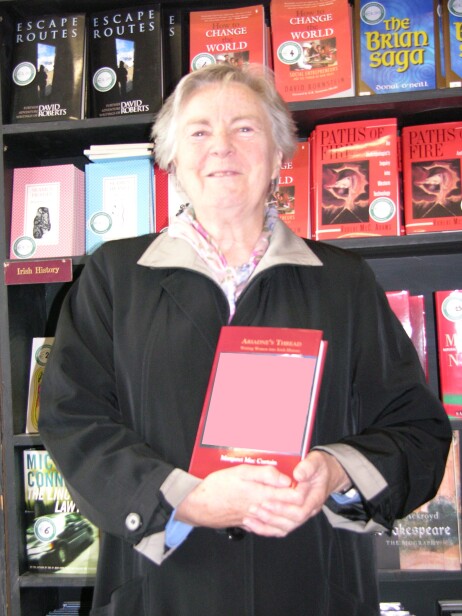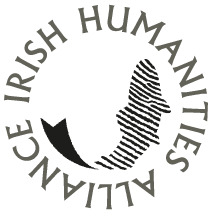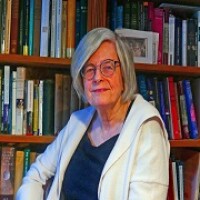‘Wisdom it was I loved and searched for her from my youth. I resolved to have her as my companion. I fell in love with her beauty ….’
At the funeral mass for Margaret MacCurtain, her grandnephew, Michael read the first reading from the Book of Wisdom, a moving and appropriate text with which to begin a celebration of Margaret’s life. The words carried an added significance as Michael’s reading emphasised that Wisdom was represented in the Biblical verse as female.
The narrative of Margaret’s life has been told in the many tributes to her since she died. She was born in Cork in 1929. Her father was a school inspector and the family lived in different parts of north Kerry and Cork before they settled in Cork. Although she lived most of her adult life in Dublin, a childhood spent in small Irish towns gave her a life long empathy with of rural Irish society.
Margaret studied History, English and Irish at University College Cork. On graduating in 1950, to her family’s surprise, she decided to enter the novitiate of the Dominican Order. She later said that the idea of a vocation had been at the back of her mind since she had spent time as a nine-year-old in the fever hospital in Listowel suffering from diptheria.
Margaret took her final vows in 1955 and was assigned to teach History in Sion Hill. After some years, she returned to university to study for an MA in Irish History and, subsequently, enrolled for a Ph.d. Her research topic was the life of the Dominican priest, Daniel O’Daly. In later life, Margaret noted, somewhat resentfully, that she had had little involvement in the selection of her doctoral topic as it had been decided in a conversation between the mother prioress in Sion Hill and her supervisor, Robert Dudley Edwards.
O’Daly was, nonetheless, a fascinating topic for a doctoral thesis. Born in Co. Kerry in 1595, he spent much of his clerical life on the continent, establishing a Dominican convent for Irish nuns in Lisbon, serving as Portuguese ambassador in Paris, working as a royal matchmaker and authoring a number of texts including a history of Geraldine family. Margaret’s thesis was a superb analysis of O’Daly’s life involving research in Portuguese, Spanish, French and Vatican archives. Unusually for a doctoral thesis it was also written in an elegant and accessible style. The thesis undoubtedly merited publication but discussions with a possible publisher did not progress and it was not until 2017 that Margaret’s friend, Maureen Murphy and Alan Hayes of Arlen Press persuaded her to publish it. Although written over fifty years ago, Ambassador Extraordinaire Daniel O’Daly, 1595-1662 remains one of the few full-length studies of the generation of post-Reformation Irish bishops who spent most of their episcopal lives on the continent. A Portuguese translation is now in preparation.
Following the completion of her Ph.d., Margaret worked part-time in UCD for a number of years until in 1966 she was appointed to a permanent teaching post. She retired from UCD in 1994. Margaret never applied for promotion. She had agreed to the suggestion of Fearghal O’Connor, O.P. whose academic career coincided with that of Margaret, that in order to avoid any anti-clerical criticism none of the four Dominican clerics on the teaching staff in UCD would go forward for promotion.
In 1969, Margaret had been an enthusiastic supporter of the student revolution in UCD. She welcomed the fresh vision of the students for the university and agreed with them that the curriculum ‘needed a good shaking up’. An overview of Margaret’s teaching and research throughout her career reveals her commitment to ‘shaking up’ the academic agenda. Her publications testify to the breadth of her intellectual interests; the sharpness of her analysis and her concern to ask the bigger questions of any historical development.
Abandoning the focus of her doctoral thesis on diplomatic and political history, Margaret pushed out the intellectual boundaries set by the first editors of Irish Historical Studies. She welcomed opportunities to work collaboratively with colleagues across the disciplinary divide. She incorporated archaeology, art, literature, folklore and geography into her historical analysis. Along with her friend and colleague, Anngret Simms, Margaret was an active member of the inter-disciplinary Group for the Study of Irish Historic Settlement, serving as president, 1977-81.
Margaret’s promotion of Irish women’s history was another way in which she disrupted the academic history agenda. In 1972, she joined with two other colleagues to propose a course comparing the history of female suffrage in Britain, Ireland and the United States. The proposal was rejected by the History Board in UCD. Accusations of lack of subjectivity and the scarcity of sources reflected the academic refusal at the time to consider the history of women as a legitimate field of study. Margaret also noted later that there was little demand among the students for such a course, a realisation that strengthened her determination to promote the intellectual value of adding the study of women to Irish historical studies.
Undaunted, therefore, by her colleagues’ opposition, Margaret proposed to RTÉ a series of lectures on the history of women to mark the United Nations International Year of Women in 1975. The resulting edited volume, Women in Irish Society: the Historical Dimension was the first academic study of Irish women’s history. Co-edited with the early medieval historian, Donnchadh Ó Corráin, the essays were authored by a politically astute selection of male and female contributors, most of whom were well-known academic experts in their field. The essay collection was a best seller (over 10,000 copies were sold) and did much to awaken public and academic interest in women’s history although it was not until 1987 that Margaret succeeded in getting a women’s history course on the curriculum in UCD.

Published: 11 Nov 2020

